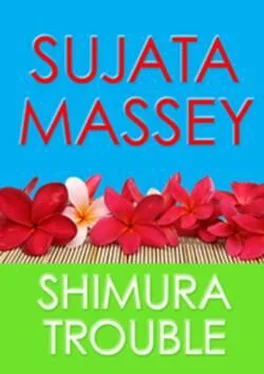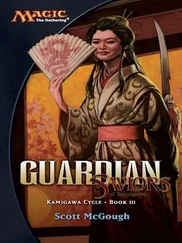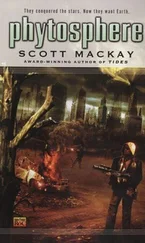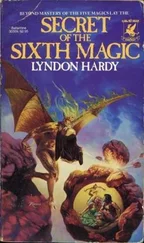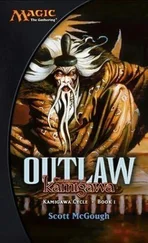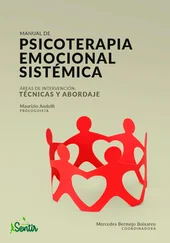Sujata Massey - Shimura Trouble
Здесь есть возможность читать онлайн «Sujata Massey - Shimura Trouble» весь текст электронной книги совершенно бесплатно (целиком полную версию без сокращений). В некоторых случаях можно слушать аудио, скачать через торрент в формате fb2 и присутствует краткое содержание. Жанр: Детектив, на английском языке. Описание произведения, (предисловие) а так же отзывы посетителей доступны на портале библиотеки ЛибКат.
- Название:Shimura Trouble
- Автор:
- Жанр:
- Год:неизвестен
- ISBN:нет данных
- Рейтинг книги:3 / 5. Голосов: 1
-
Избранное:Добавить в избранное
- Отзывы:
-
Ваша оценка:
- 60
- 1
- 2
- 3
- 4
- 5
Shimura Trouble: краткое содержание, описание и аннотация
Предлагаем к чтению аннотацию, описание, краткое содержание или предисловие (зависит от того, что написал сам автор книги «Shimura Trouble»). Если вы не нашли необходимую информацию о книге — напишите в комментариях, мы постараемся отыскать её.
Shimura Trouble — читать онлайн бесплатно полную книгу (весь текст) целиком
Ниже представлен текст книги, разбитый по страницам. Система сохранения места последней прочитанной страницы, позволяет с удобством читать онлайн бесплатно книгу «Shimura Trouble», без необходимости каждый раз заново искать на чём Вы остановились. Поставьте закладку, и сможете в любой момент перейти на страницу, на которой закончили чтение.
Интервал:
Закладка:
“Really,” I said. This corroborated everything I knew about the folkways of the Shimura family. I wanted to continue, but Edwin cut in.
“It’s time for eat. Our dining table isn’t so big, so we serving food in the kitchen, and you can bring it out here. Please, come try.”
My father had been ushered to the front of the buffet line, so he was well away from my gaze. I couldn’t possibly cut in front of everyone to supervise his food choices. I could only worry.
An hour later, I realized that my father’s decision to eat barbecued pork, sticky rice and deep-fried vegetable tempura was the least of my problems. As Margaret sliced a coconut cake, Edwin opened his agenda, and pretty much everything I had feared about this trip came to pass.
8
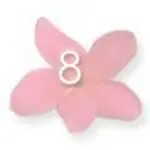
“LET’S TALK ABOUT the meaning of family.” Edwin canvassed the table. “Jii-chan, tell everybody how it feels to suddenly realize you have two nephews and their families to celebrate your birthday? Good feeling, yah?”
There were polite murmurings from everyone.
“I got a whole lot of family history to teach you guys.” Edwin seemed to be pointing his chopstick directly at me. “Things that happened here to us-to this family-you need to know!”
I sat numbly as Edwin narrated the story I’d gleaned from internet news sites: that in the 1930s Harue Shimura owned a small house on one and a half acres of land near Barbers Point, the old naval station. Harue had lived there after she’d retired from work on the plantation, around the time Yosh was starting his first job with the post office in Honolulu. Then, after Pearl Harbor was bombed and Yoshitsune was sent to an internment camp for Japanese-Americans in Idaho, Harue died of a stroke. When Yoshitsune returned in late 1946, the land and cottage had been taken over.
I interrupted, because Uncle Edwin had casually dropped in some information I hadn’t heard before. “Uncle Yosh, you were interned in a camp for Japanese-Americans?”
Yoshitsune only nodded, and I looked expectantly at him, wanting more. This was a stunning bit of family history, because very few Japanese born in Hawaii had been interned. The plantation owners had convinced the US government that their workers were loyal, and that the sugar industry would collapse if Japanese in Hawaii were taken away.
“I heard some first generation and nisei Japanese from Hawaii were sent to the camps on the mainland, but they were rare cases, weren’t they?” I said, choosing my words carefully. “How unlucky that you were among the few taken away.”
“Jii-chan worked at the post office.” Courtney spoke up, surprising me. “The boss thought he was trying to look into military mail.”
“Yes, a complete set-up, if you ask me. They just wanted him to be gone.” Edwin sounded bitter. “And we had the waterfront property, which they thought would allow him or my grandmother to send signals to the enemy.”
My father, Tom and Uncle Hiroshi had grown as still and quiet as Yoshitsune. I imagined our group was contemplating our own family history: how Harue Shimura’s older brother became a right-wing historian who’d tutored the emperor, and the other brother had been an officer in the Imperial Army. We were the enemy, as far as anyone outside of Japan was concerned.
“Please, will you tell us about the internment? If it’s not too difficult,” my father said after a pause.
“It was called Minidoka, in Idaho. A small place, with barbed-wire fence and around that, mountains,” Uncle Yoshitsune answered in a flat voice. “We had no idea how long we’d be there. I felt I had to escape.”
“Jii-chan was smart. He found the way,” Courtney said. I smiled at my young cousin, thinking that her interest in family history reminded me of my own, when I was her age.
“One day some army officers came to visit,” Yoshitsune said, interrupting my thoughts. “They were recruiting guys who could speak and read Japanese to work in intelligence. I volunteered. I did interrogations for the American and British military.”
“It’s a great story, Dad. You some hero!” Edwin’s words were quick; clearly, he wanted to return to his agenda.
Yoshitsune seemed to shrink into himself then. While I longed to keep the conversation going about intelligence, I knew it was probably better to do it later, when fewer people were around.
Edwin took over again. “You heard the terrible thing that happened to my Dad? Think of how it was for him, when he came home, a free man who served this country in the war. He find his mama gone forever, and all of a sudden Chinese people living on the land who say the Pierces leased it to them.”
“Ah, yes, Rei told us about that already,” my father said, nodding.
“Internet search engines are useful, aren’t they?” I said, in response to Edwin’s injured look.
“The papers don’t tell the real story. My father tried to ask Mrs. Pierce what happened to our house, because the old man was dead. She said there was never a fee-simple sale to my mother-always just leasehold, and that had expired. That Pierce woman said the land couldn’t remain idle, so she rented it to Winston Liang and his wife.”
“Well, since you don’t have a deed of sale, do you think it’s possible that your mother might have actually had a lease?” I turned to Yoshitsune, because I wanted to hear the story from him directly.
“I once saw a letter,” Yoshitsune said in a low voice. “I found it sometime, must have been the mid-thirties, in her bedroom dresser. The letter said that Harue Shimura was granted this land in exchange for faithful service. It was signed by Josiah Pierce.”
“A paper,” I repeated, thinking that it didn’t sound anything like an official, legal deed at all-but who knew how things operated in prewar Hawaii?
“The paper’s gone,” Yoshitsune said, dashing my hopes. “Everything was gone when I came back from the mainland.”
As if to put an exclamation mark on the disappointment, there was a bang at the front door, and after a moment, a teenage boy stuck his head around the corner of the dining room. He had the same attractively tilted dark brown eyes as his sister, but wore his black hair shaved close to his head. A Hawaiian skinhead, I thought, taking in the ripped T-shirt with its Quiksilver logo and way-too-long board shorts.
“Braden, you get your sorry self in here!” Edwin roared. “Where you been so long?”
“Nowhere you need to know about.” Braden scraped his chair loudly as he sat down with a plate containing nothing but pork.
“Braden, please. It’s Jii-chan’s belated birthday celebration,” Margaret said. “Your cousins have been waiting to meet you!”
The boy glanced at each of us as his mother made the introductions. Tom and Hiroshi made slight bows from their positions at the table, but I didn’t bother. I had a feeling that Braden would mock anything Japanese about us. His sister was watching him too, as if she expected something to happen.
Edwin picked up the conversation we’d been having before the sullen teenager’s arrival. “Now, like I was saying, this land, it was very nice because it’s waterfront. Even on the Leeward Side of Oahu, waterfront property is worth a lot of money. The Japanese developer who built Kainani wants to buy twenty acres, of which our land is a small part-but probably worth five or six million.”
“Are you talking about the developer called Mitsuo Kikuchi?” I asked, glad for something to distract me from Braden. He was chewing with his mouth slightly open, a disgusting sight.
“Yes indeed,” Edwin answered me. “Mitsuo Kikuchi wants to buy all that land from the Pierces to make a restaurant development.”
Читать дальшеИнтервал:
Закладка:
Похожие книги на «Shimura Trouble»
Представляем Вашему вниманию похожие книги на «Shimura Trouble» списком для выбора. Мы отобрали схожую по названию и смыслу литературу в надежде предоставить читателям больше вариантов отыскать новые, интересные, ещё непрочитанные произведения.
Обсуждение, отзывы о книге «Shimura Trouble» и просто собственные мнения читателей. Оставьте ваши комментарии, напишите, что Вы думаете о произведении, его смысле или главных героях. Укажите что конкретно понравилось, а что нет, и почему Вы так считаете.
